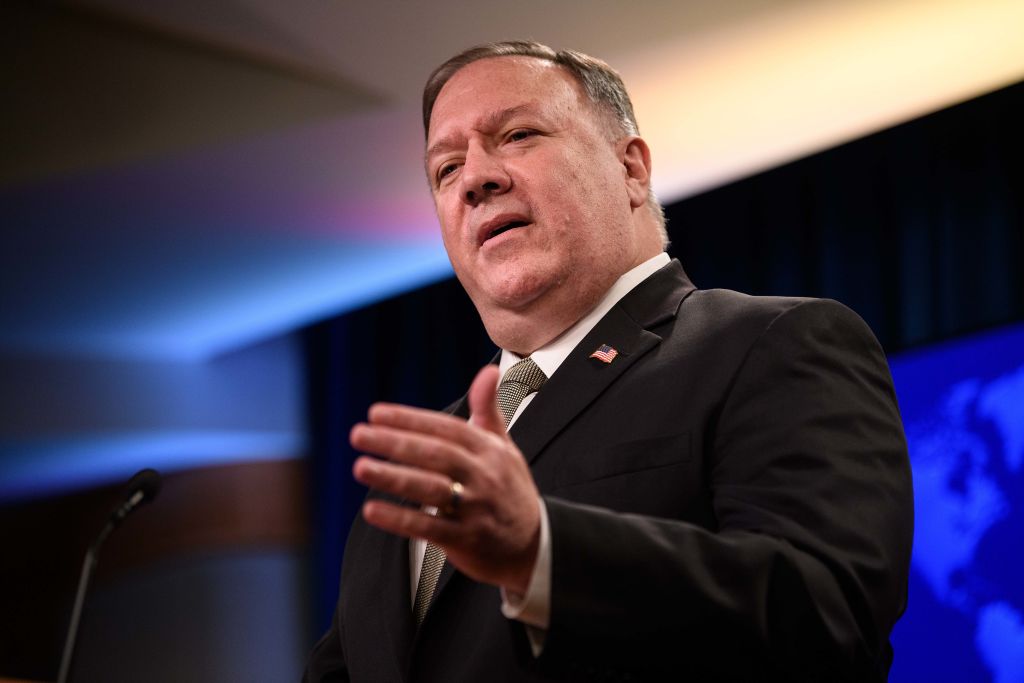Don’t Stay in Iraq Because of Iran

The Trump administration’s January killing of Iranian General Qassem Soleimani in Iraq was supposed to “[reestablish] deterrence, real deterrence, against the Islamic Republic of Iran,” as Secretary of State Mike Pompeo put it at the time. He didn’t mean deterrence against direct Iranian attacks on the United States—that is already well-established by the enormous discrepancy in military might between our two countries, not to mention the vast physical distance separating the Islamic Republic from America. Pompeo rather had in mind deterrence against Iranian activity in its own region, particularly its influence in neighboring Iraq, site of the second-longest (and second-most expensive) war in American history.
That deterrence was not reestablished. The Soleimani strike brought us to the brink of war and made U.S.-Iran relations the worst they’ve been in decades. But it did not oust Iran from Iraq.
In fact, recent attacks by Iran-linked Shiite militias now have Pompeo threatening to shutter the U.S. embassy in Baghdad if the Iraqi government doesn’t do more to prevent such assaults. This is probably an empty threat given the cost of the facility and the administration’s disinterest in ending this war, but its mention, like any suggestion of U.S. drawdown in Iraq, has hawkish voices worrying about ceding influence to Tehran. “We would be giving the Iranians more than they ever dreamed of,” an unnamed former U.S. official told The Wall Street Journal. “This has been their major strategic goal: To get us out of Iraq.”
This line of thinking—that we must stay in Iraq to counter Iran (or “watch” it, in President Trump’s phrase)—is naïve and detrimental. It gets three things wrong.
First is the idea that we can excise Iranian influence in Iraq and elsewhere in the region by military means and/or the Trump administration’s counterproductive “maximum pressure” campaign of sanctions and opposition to the Obama-era Iran nuclear dear. Iran is Iraq’s neighbor and has a sizable Shiite Muslim population that helps establish cultural ties with Shiite-dominated Iran. Realistically, they will interact. “There’s also the reality that Iran doesn’t fully control the Shiite militias currently in the U.S.’s crosshairs,” as a Washington Post report recently observed. U.S. foreign policy can’t sever these connections. If anything, the maximum pressure approach has incentivized Tehran to escalate its regional influence campaign and troublemaking to prove it won’t bend under U.S. pressure.
The second wrong assumption undergirding the Iran-centric case for staying in Iraq is that Tehran wants Iraq to descend into chaos. “Iran wants to boot the Americans out, but not at any cost. It doesn’t want instability on its western border,” an Iraqi Shiite leader said in response to the embassy withdrawal threat. A calm Iraq is in Iran’s interest—recall, for example, that Iran was the first country to promise to help Iraq combat the Islamic State, a Sunni extremist group that abjures Iran’s Shiite majority. That help is thought to include air strikes and ground support for the Iraqi military under Soleimani’s command.
Finally, that Iran wants the U.S. out of Iraq should not be the deciding factor for Washington. Leaving Iraq after 17 years of war is the necessary and prudent choice for the United States—and that Iran has the same goal does not outweigh this truth. Iran’s opinion does nothing to change this war’s record of failure and chaos, its too-high cost in blood and treasure, and its deep unpopularity with the American people. If anything, improved relations with Iran could be a benefit of withdrawing from Iraq, signifying to Tehran that another war of regime change is not our desire, having learned our lesson in Baghdad.
It is past time to reject our two-decade policy of endless military intervention. Leaders in Washington can begin by realizing Iranian influence in Iraq is not an inherent threat to the U.S., and certainly not an excuse for further years of war.
Bonnie Kristian is a fellow at Defense Priorities, contributing editor at The Week, and columnist at Christianity Today. Her writing has also appeared at CNN, NBC, USA Today, the Los Angeles Times, and Defense One, among other outlets.
Comments